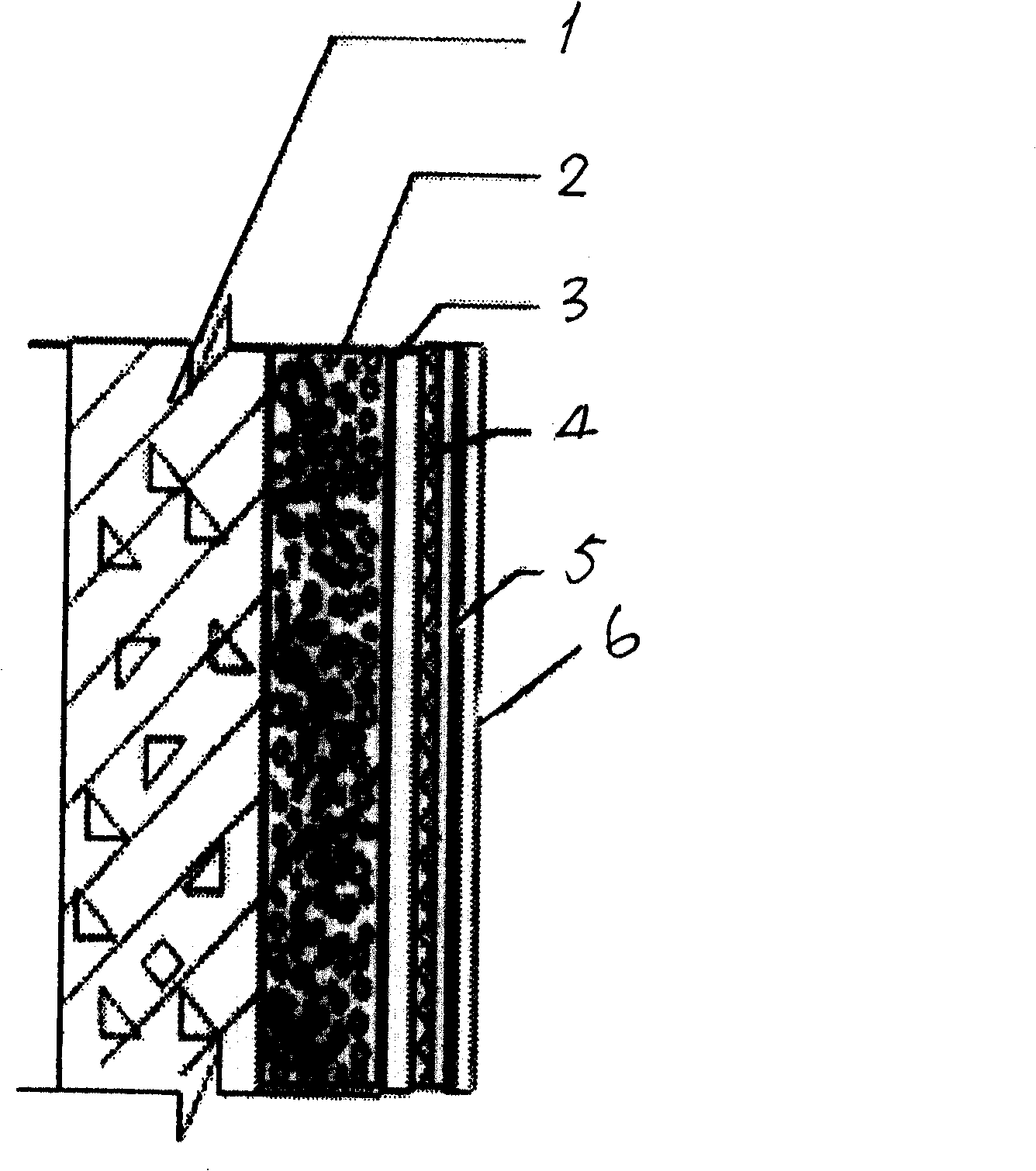Method for making self-temperature-regulating phase-change heat-insulation wall and product thereof
A technology of composite thermal insulation and manufacturing methods, which is applied in chemical instruments and methods, building structures, solid waste management, etc., can solve problems such as poor fire resistance, cracks in plastering mortar, and low firmness of insulation layers, and achieve high thermal insulation Effect, the effect of the ability to raise the indoor temperature
- Summary
- Abstract
- Description
- Claims
- Application Information
AI Technical Summary
Problems solved by technology
Method used
Image
Examples
Embodiment 1
[0069] A method for manufacturing a self-temperature-regulating phase-change composite thermal insulation wall, wherein self-temperature-regulating phase-change mortar is scraped and coated on the outside of the wall, thermal-insulation putty is scraped and coated on the outside of the self-temperature-regulating phase-change mortar, and then scraped and coated on the outside. Elastic putty, application of sealer primer and finally thermal insulation coating on top.
[0070] Said self-regulating phase change mortar is composed of the following components according to weight percentage:
[0071] Self-regulating phase change material 10%;
[0072] 15% of hollow fiber material;
[0073] Dispersible rubber powder 18%;
[0074] Cement 22%;
[0075] Light aggregate 35%.
[0076] Put the above-mentioned self-temperature-regulating phase change material, hollow fiber material and light aggregate in the first mixing tank, stir and disperse them for 20-30 minutes as the first compon...
Embodiment 2
[0095] A method for manufacturing a self-temperature-regulating phase-change composite thermal insulation wall, wherein self-temperature-regulating phase-change mortar is scraped and coated on the outside of the wall, thermal-insulation putty is scraped and coated on the outside of the self-temperature-regulating phase-change mortar, and then scraped and coated on the outside. Elastic putty, application of sealer primer and finally thermal insulation coating on top.
[0096] In the above-mentioned technical scheme, the said thermal insulation putty is composed of the following components according to weight percentage:
[0097] Rubber powder 18%;
[0098] Cement 16%;
[0099] Light aggregate 35%;
[0100] Fiber 13%;
[0101] Expanded glass beads 18%;
[0102] The said fibers are a mixture of inorganic fibers and organic fibers;
[0103] The light aggregates mainly include one or more mixtures of diatomite, float beads, ceramsite, fly ash, expanded vitrified microbeads, ho...
Embodiment 3
[0106] A method for manufacturing a self-temperature-regulating phase-change composite thermal insulation wall, wherein self-temperature-regulating phase-change mortar is scraped and coated on the outside of the wall, thermal-insulation putty is scraped and coated on the outside of the self-temperature-regulating phase-change mortar, and then scraped and coated on the outside. Elastic putty, application of sealer primer and finally thermal insulation coating on top.
[0107] In above-mentioned technical scheme, said elastic putty is made up of following components, according to weight percentage:
[0108] Elastic Lotion 12%;
[0109] Synthetic rubber powder 12%;
[0110] Quartz powder 23%;
[0112] Talc 13%;
[0113] Water 27%.
[0114] Put the above synthetic rubber powder, quartz powder, calcium carbonate, talc powder and water together and fully stir for 20-36 minutes, then add elastic emulsion and stir slowly to form a paste.
PUM
| Property | Measurement | Unit |
|---|---|---|
| thickness | aaaaa | aaaaa |
Abstract
Description
Claims
Application Information
 Login to View More
Login to View More - R&D
- Intellectual Property
- Life Sciences
- Materials
- Tech Scout
- Unparalleled Data Quality
- Higher Quality Content
- 60% Fewer Hallucinations
Browse by: Latest US Patents, China's latest patents, Technical Efficacy Thesaurus, Application Domain, Technology Topic, Popular Technical Reports.
© 2025 PatSnap. All rights reserved.Legal|Privacy policy|Modern Slavery Act Transparency Statement|Sitemap|About US| Contact US: help@patsnap.com

